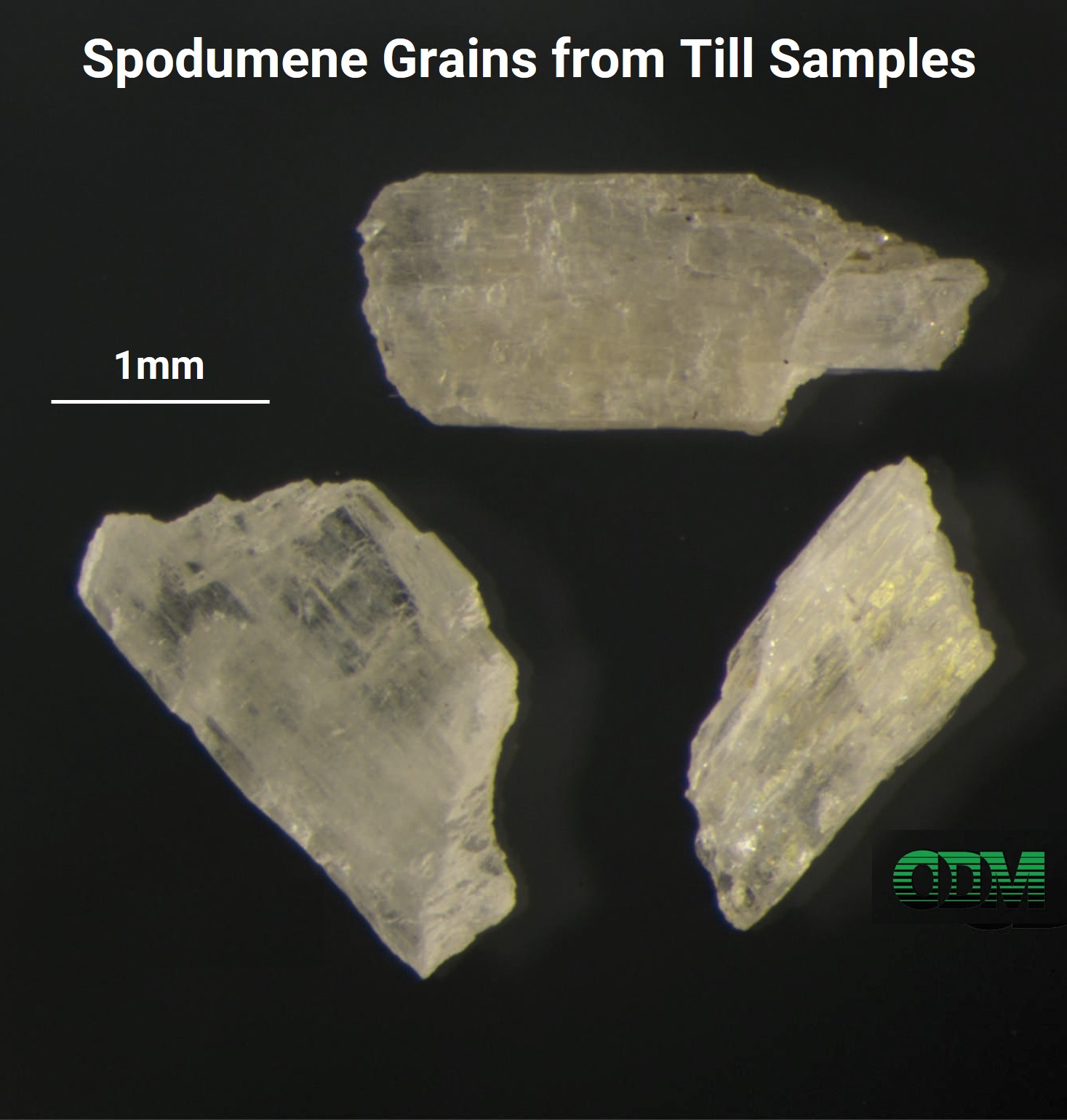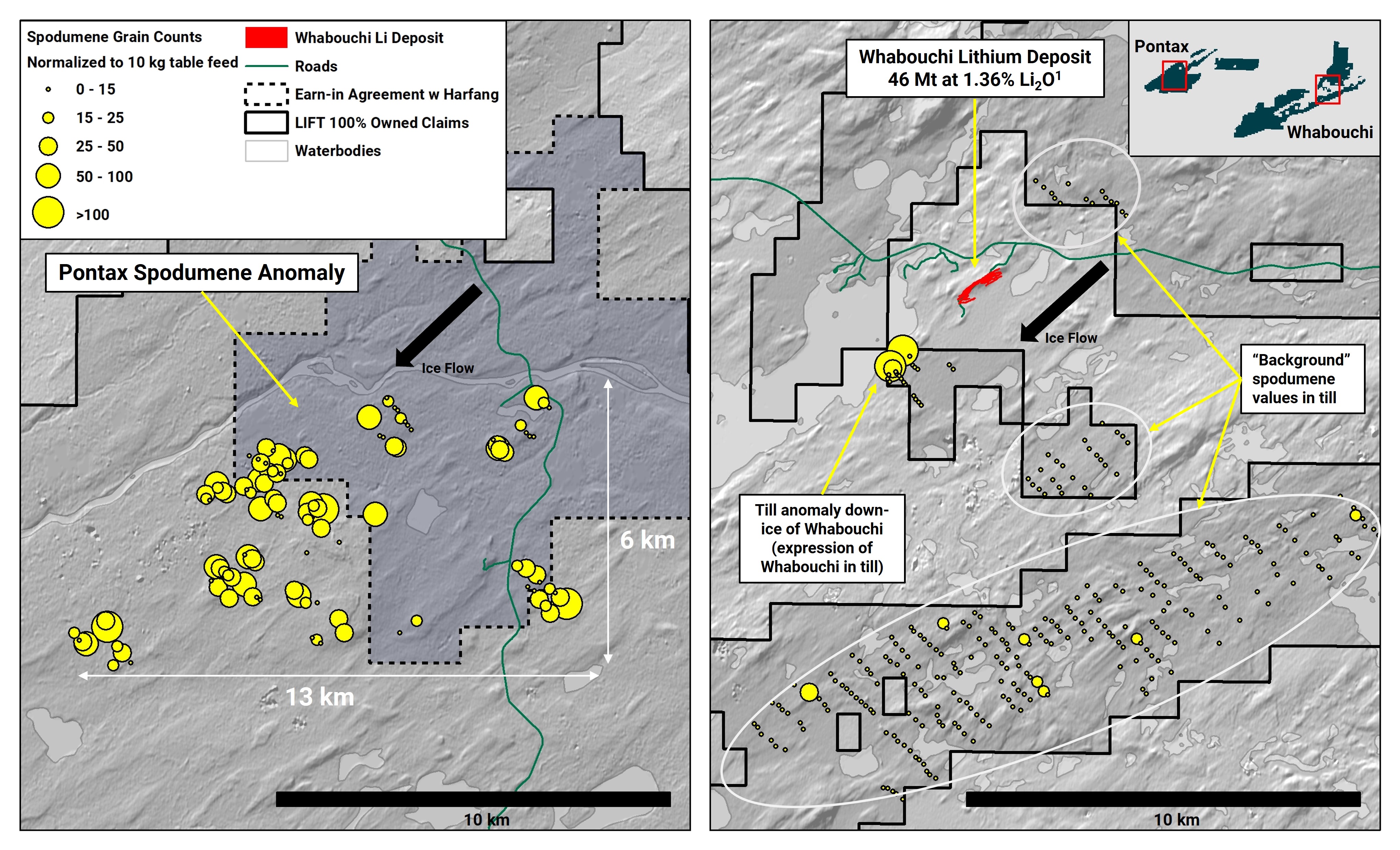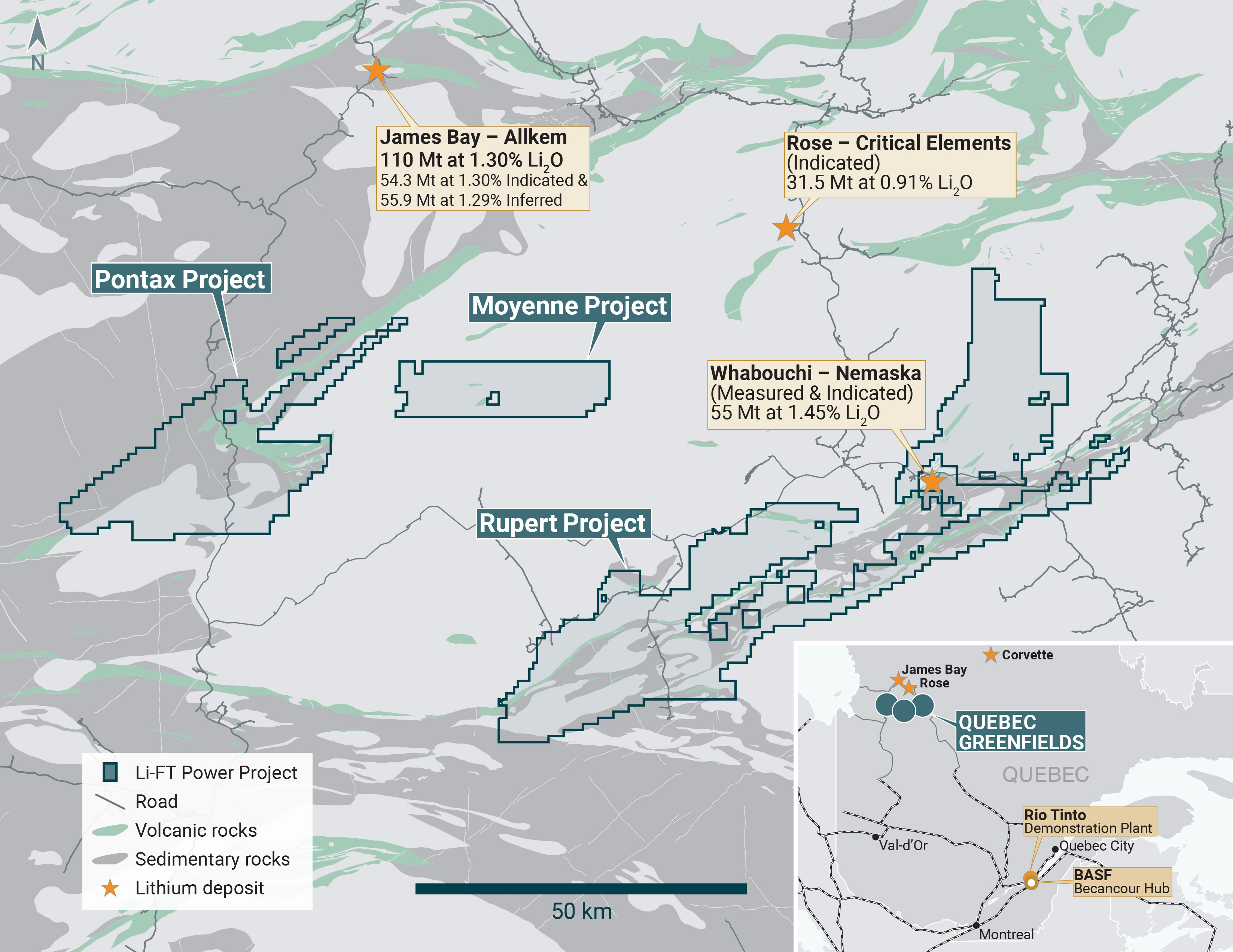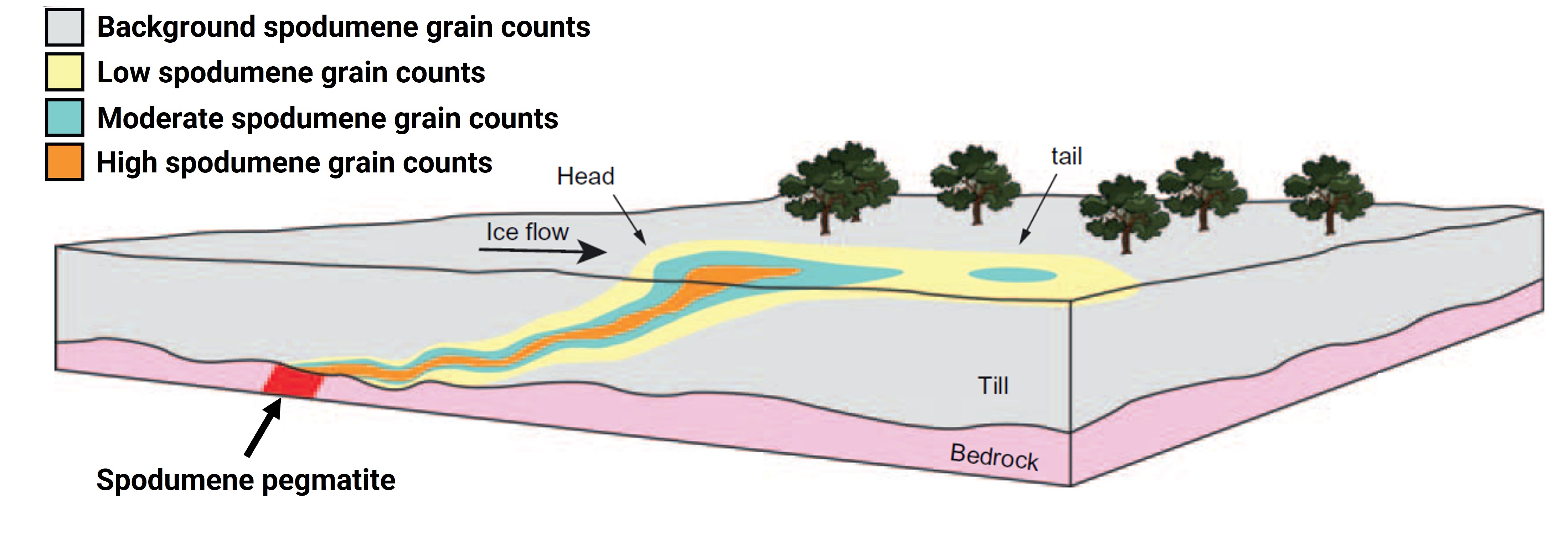LIFT defines 13 km by 6 km spodumene-in-till anomaly at the Pontax Lithium Project, Quebec, and updates on other Quebec exploration activities
Li-FT Power reported results from its summer 2023 exploration program at the Pontax Project and the Rupert Project in Quebec. An impressive 13 km by 6 km spodumene anomaly was defined at Pontax, suggesting a potential large spodumene pegmatite dyke swarm buried beneath glacial sediments. Additional spodumene anomalies were found on the Rupert property. The company collected rock samples with lithium values of up to 0.56% Li2O and conducted a till sampling program to test for lithium anomalies.
Discovery of an impressive 13 km by 6 km spodumene anomaly at the Pontax Project.
Potential for a large spodumene pegmatite dyke swarm buried beneath glacial sediments.
Additional spodumene anomalies identified on the Rupert property.
Rock samples with lithium values of up to 0.56% Li2O were collected.
No economically viable lithium values found in the rock samples collected.
No significant spodumene pegmatites intersected in the diamond drilling completed in 2023.
VANCOUVER, British Columbia, May 02, 2024 (GLOBE NEWSWIRE) -- Li-FT Power Ltd. (“LIFT” or the “Company”) (TSXV: LIFT) (OTCQX: LIFFF) (Frankfurt: WS0) is pleased to report results from its summer 2023 exploration program at the Pontax Project and the Rupert Project, both in the James Bay region of Quebec. Pontax is comprised of
The summer 2023 surface exploration program was comprised of geologic mapping, prospecting, and glacial-sediment (till) sampling. Till samples were processed to look for spodumene grains within the till. The results at Pontax revealed a 13 km by 6 km anomaly that has spodumene grain counts similar to till down-ice of the Whabouchi lithium deposit, located approximately 2 km northeast of LIFT’s sampling. Additional spodumene anomalies were defined on the Rupert property where, importantly, background values have been well-defined (Figure 2).
Francis MacDonald, CEO of LIFT comments, “The size and strength of the Pontax spodumene anomaly is very impressive. We understand the expression of a large spodumene resource in till from our sampling results down-ice of the Whabouchi lithium deposit. The anomaly that we have defined at Pontax has similar amounts of spodumene grains in till, but we are seeing this anomalism over a 13 km by 6 km area in comparison to a 4 km by 1 km area down-ice of Whabouchi. The implication of this is that we believe there is potential for a large spodumene pegmatite dyke swarm buried beneath extensive glacial sediments in the Pontax area. The next exploration program will be tailored to narrowing this large area down to drill targets”.

Figure 1 – Spodumene grains from glacial till sampling in the Pontax area.

Figure 2 - Pontax spodumene anomaly vs. the Whabouchi Li Deposit (Arcadium Lithium & Investissement Quebec). The spodumene anomaly down-ice of Whabouchi is similar to many areas within the Pontax project. The strength of the anomalies in the Pontax areas may indicate a spodumene pegmatite dyke swarm is present nearby, beneath glacial sediments.

Figure 3 - Location of the Pontax, Rupert, and Moyenne projects, James Bay region, Quebec.
Discussion of till sampling program
Till sampling for geochemistry or indicator minerals has been used extensively in Canada and other regions previously covered by glaciers (see Figure 4) to make a number of discoveries beneath the transported sediment cover (e.g. Rainy River (Gold), Ekati (Diamonds), East Kemptville (Tin), Regnault (Gold), Casa Berardi (Gold), Blackwater (Gold)). In addition to new discoveries, many orientation surveys have been completed over previously discovered deposits that suggest a till sampling program would have been a successful methodology if employed during early exploration phases (e.g. Meliadine (Gold), Madrid (Gold), Strange Lake (REE-Be), Lac des Isles (PGE)).
The Pontax Project is located within an area that was inundated by the Tyrell Sea at the end of the last glaciation period. The surficial sediment cover in the project area consists of till overlain locally by Tyrrell Sea mud and reworked locally by littoral processes during subsequent regression of the sea (Hardy, 1976; Lamarche et al., 2018). Thick post-glacial organic wetland deposits cap the succession locally. The till has a silty sand matrix, contains abundant locally sourced igneous and metamorphic clasts, and is ornamented by various types of streamlined landforms that trend southwest-northeast, including drumlins, crag-and-tails, and tongue-shaped landforms. Till samples were collected from topographic highs where till outcrops can be found penetrating through the blanket of glaciomarine mud found in the lowlands.
The Rupert-Pontax spodumene grain count sampling program was designed to test areas with anomalous till geochemistry for lithium (see press release dated November 9, 2022). Samples were spaced at roughly 800 meters by 200 meters on the Rupert sampling grid, and at Pontax sample spacing along the line was 200 meters with sampling being taken where possible on topographic highs due to glaciomarine clay filling topographic lows. 10 kilograms of till was collected from each sampling site and sent to Overburden Drilling Management for processing and spodumene grain counts.

Figure 4 - Schematic of glacial dispersal of spodumene grains from bedrock into glacial sediments at surface. A buried spodumene pegmatite has been eroded by southwesterly flowing ice during the last glaciation event which has mechanically transported boulders of spodumene pegmatite, as well as spodumene grains, from the bedrock source into the overlying glacial sediments (modified from McClenaghan 2017).
Additional surface work completed in 2023
In addition to spodumene grain counts, LIFT collected 1,654 rock samples which returned lithium values of up to
5,700 C-horizon matrix till geochemistry samples were collected on newly acquired claims and areas not sampled in 2022. Till geochemistry was used to vector into areas for additional sampling testing for the presence of spodumene grains within till.
A VTEM-Magnetics survey was completed to the northeast of Power Nickel’s Lion Zone target. Power Nickel intersected 7.75 meters at 20.76 g/t Pt, 5.71 g/t Pd,
Update on drilling completed in 2023
During the summer of 2023, LIFT completed 12 diamond drill holes (4,069 meters) to test lithium (+/- Ta-Sn-Nb) anomalies in till geochemistry to the north of the Whabouchi lithium deposit (Anomalies A and B; see press release dated March 29, 2023). All drill holes encountered granitic rocks with lithium values between 100-300 ppm, pegmatites with negligible lithium values, and mafic dykes that have are slightly enriched in lithium (300-700 ppm). No significant spodumene pegmatites were intersected and no additional drilling is warranted in that particular area.
About the Pontax Option
Under the terms of the option agreement with Harfang, LIFT can acquire up to a
QA/QC & Sampling Protocols
10 kg till samples: Till samples were shipped to Overburden Drilling Management (ODM) in Ottawa, Ontario for processing by panning and a shaking table to produce heavy mineral concentrates, ODM further refined the concentrates using heavy liquid separation to produce mid-density concentrates which they then picked for indicator minerals. Representative spodumene and other minerals are checked using a scanning electron microscope to confirm identification. ODM removes a 300 gram archival split for each sample.
Rock Samples and Drill Core: Sample preparation and analytical work for this drill program were carried out by Bureau Veritas in Vancouver, Canada. Samples were prepared for analysis according to BV method PRP70-250: individual samples were crushed to
Till geochemistry samples: Till geochemistry samples were collected from between 20 - 80 centimeters below surface, from the C-horizon of the till. Approximately one kilogram of material was collected from each sample site and shipped to Bureau Veritas ("BV") in Timmins, Ontario for preparation. Samples were prepared for analysis according to BV method SS230 whereby individual samples were sieved to isolate the -230 mesh (-63 microns) fraction. Samples were analysed at BV in Vancouver, British Columbia with BV methods MA250 (4-acid digestion with ICP-MS finish) for multi-element data (0.25-gram split is heated in HNO3, HClO4 and HF to fuming and taken to dryness). A 30-gram split was analyzed with BV method AQ130 (aqua regia with ICP-MS finish) for gold analysis.
Qualified Person
Don Cummings, P.Geo (OGQ # 2183), independent consultant to Li-FT Power Ltd., Qualified Person under NI 43-101 on standards of disclosure for mineral projects, has reviewed and approved the technical content of this release.
About LIFT
LIFT is a mineral exploration company engaged in the acquisition, exploration, and development of lithium pegmatite projects located in Canada. The Company’s flagship project is the Yellowknife Lithium Project located in Northwest Territories, Canada. LIFT also holds three early-stage exploration properties in Quebec, Canada with excellent potential for the discovery of buried lithium pegmatites, as well as the Cali Project in Northwest Territories within the Little Nahanni Pegmatite Group.
For further information, please contact:
| Francis MacDonald Chief Executive Officer Tel: + 1.604.609.6185 Email: info@li-ft.com Website: www.li-ft.com | Daniel Gordon Investor Relations Tel: +1.604.609.6185 Email: investors@li-ft.com |
Cautionary Statement Regarding Forward-Looking Information
Certain statements included in this press release constitute forward-looking information or statements (collectively, “forward-looking statements”), including those identified by the expressions “anticipate”, “believe”, “plan”, “estimate”, “expect”, “intend”, “may”, “should” and similar expressions to the extent they relate to the Company or its management. The forward-looking statements are not historical facts but reflect current expectations regarding future results or events. This press release contains forward looking statements. These forward-looking statements and information reflect management's current beliefs and are based on assumptions made by and information currently available to the company with respect to the matter described in this new release.
Forward-looking statements involve risks and uncertainties, which are based on current expectations as of the date of this release and subject to known and unknown risks and uncertainties that could cause actual results to differ materially from those expressed or implied by such statements. Additional information about these assumptions and risks and uncertainties is contained under "Risk Factors" in the Company's latest annual information form filed on March 27, 2024, which is available under the Company's SEDAR+ profile at www.sedarplus.ca, and in other filings that the Company has made and may make with applicable securities authorities in the future. Forward-looking statements contained herein are made only as to the date of this press release and we undertake no obligation to update or revise any forward-looking statements whether as a result of new information, future events or otherwise, except as required by law. We caution investors not to place considerable reliance on the forward-looking statements contained in this press release.
Neither the TSX Venture Exchange nor its Regulation Services Provider (as that term is defined in the policies of the TSX Venture Exchange) accepts responsibility for the adequacy or accuracy of this news release.
Photos accompanying this announcement are available at:
https://www.globenewswire.com/NewsRoom/AttachmentNg/804eb346-4399-478a-aaef-483fb2e9e9c5
https://www.globenewswire.com/NewsRoom/AttachmentNg/d46a50af-7a81-4039-a511-ce844028470b
https://www.globenewswire.com/NewsRoom/AttachmentNg/99d469f0-2298-40dc-849b-bab2d57a91d6
https://www.globenewswire.com/NewsRoom/AttachmentNg/2c1070e4-dbf6-413c-a141-93a63b48d76d








